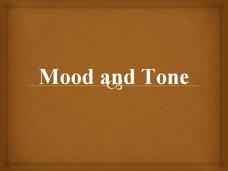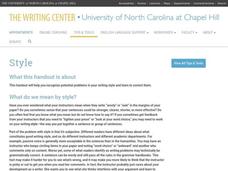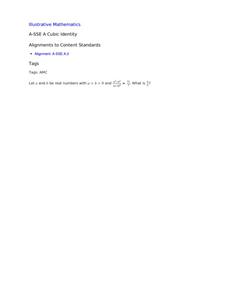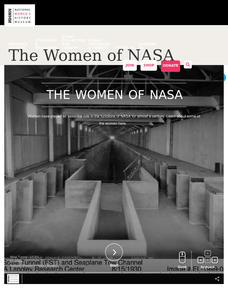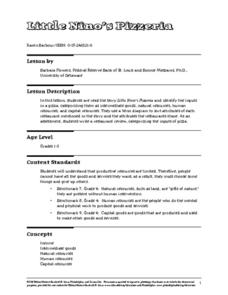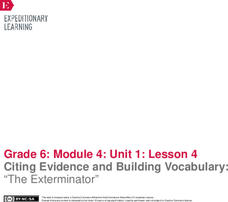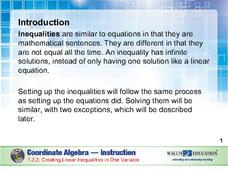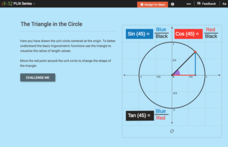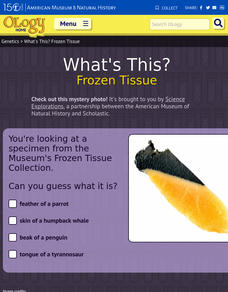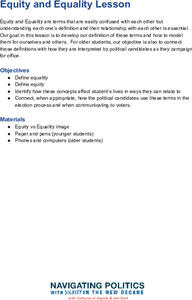K20 LEARN
Nose Like a Cherry: Understanding Similes and Metaphors
Clement Moore's "Twas the Night Before Christmas" models the power of descriptive language for middle schoolers. They identify the similes and metaphors in the tale and consider what these descriptions add to the story's emotional...
Anti-Defamation League
"What is it Like to be an Outsider?”: Building Empathy for the Experiences of Immigrants
This lesson highlights the struggles of immigrants and the importance of showing empathy. Beginning with a read-aloud of a book in another language and a poem, scholars take part in a thoughtful discussion. Then, the class examines a...
Curated OER
Identifying Terms, Factors, and Coefficients
What are terms, factors, and coefficients? This slideshow provides definitions and examples of various parts of algebraic expressions, and provides guided practice problems in writing and identifying parts of algebraic expressions for...
Plainfield Public School District
Mood and Tone
"It was a dark and stormy night. Perfect for making Christmas cookies." Distinguishing between the mood of a piece and the tone can be tricky, but with the help of this presentation viewers quickly see and are able to identify the...
Smarter Balanced
How the Brain Works
Cerebrum, cerebellum, brainstem, pituitary gland, and spinal cord. Prepare your class for a performance task assessment on the brain and how it works with a scripted plan that defines these terms and identifies the functions the...
University of North Carolina
Style
Just like you choose your clothes to ensure they fit the occasion, you should choose your words deliberately while writing. Style, the main topic of one handout in a series on writing skills, involves choosing words carefully and paying...
Illustrative Mathematics
An Integer Identity
Challenge algebra learners to use the difference of cubes to solve this problem. Once your charges have taken out the factor (a - b), combined the like terms and set them equal to zero, the problem becomes a factorable quadratic...
National Woman's History Museum
The Women of NASA
Human computers? Although it may sound like science fiction, the term was used to describe the women who made the NASA calculations before the advent of electronic computers. A 21-slide presentation introduces viewers to the women who...
EngageNY
Writing Products as Sums and Sums as Products II
Explain algebraic relationships through an understanding of area and perimeter. Continuing concepts built in the third instructional activity of the series, the fourth installment of 28 asks learners to identify common expressions...
Willow Tree
Fibonacci and Other Sequences
Fibonacci is an interesting sequence that forms some unique patterns. Learners explore sequences that do not have the typical arithmetic and geometric patterns. They identify the pattern and find the next consecutive terms....
District 186 Springfield Public Schools
Tone, Mood, Theme, and Motif
It's all well and good when you're asked to identify a speaker's tone using his or her body language, facial expression, and pitch and emphasis. Identifying the tone of a written passage is another challenge entirely. Check out an...
Federal Reserve Bank
Little Nino's Pizzeria
Engage your youngsters in basic economics by connecting the terms to dessert and pizza! After a discussion about intermediate goods and natural resources, learners read and connect a pizzeria to economic terms.
EngageNY
Citing Evidence and Building Vocabulary: “The Exterminator”
It is an out-of-body experience. Scholars take a look at the sidebars outside the body of the text in The Exterminator. They discuss the purpose of this type of text feature and work to determine the gist. Learners write unfamiliar...
BW Walch
Creating Linear Inequalities in One Variable
Just when a young mathematician starts to feel comfortable turning word problems into linear equations, shake things up and throw inequalities in the mix. This excellent, instructive presentation takes the steps for solving an...
CK-12 Foundation
Trigonometric Functions and Angles of Rotation: The Triangle in the Circle
Go around the unit circle and create triangles. Pupils move a point around the unit circles to visualize the triangle associated with the angle in standard position. The three main trigonometric functions are defined in terms of the legs...
American Museum of Natural History
What's This? Frozen Tissue
Take a peek into thousands of frozen samples. Learners try to identify an image of a piece of frozen tissue. After choosing the correct answer, scholars find out more information about the American Museum of Natural History's Frozen...
K5 Learning
I Have Been Thinking…
Scholars read a short story about a girl visiting her grandmother, identify the main idea of the tale, and then write a sentence about this idea. Learners practice their phonics skills by filling in word blanks with letters to complete...
Visa
Using Credit Wisely
Receiving credit can be both a benefit and a curse. Prepare your learners to make wise credit choices by studying how credit influences credit scores, identifying the different components of credit cards, and exploring major consumer...
Annenberg Foundation
Teaching Geography: Workshop 4—North Africa/Southwest Asia
Can Jerusalem be equitably organized? Can Israel and Palestine be successfully partitioned? Part one of a two-part workshop looks at the geo-political history of Jerusalem while Part two investigates Egypt's dependence of the Nile River...
University of Oklahoma
Getting Started
"Getting Started" is a two-lesson unit focused on familiarizing high schoolers with the concepts of self-awareness and self-advocacy. Learners identify their strengths and weaknesses, likes and dislikes in a ME: Book that they will use...
American Farm Bureau Foundation for Agriculture
Shapes in Agriculture
It's time to get crafty with shapes! Your future farmers demonstrate their geometric ability by building a farm using triangles, circles, rectangles, and squares. But first, scholars take part in a brainstorm session inspired by their...
Cultures of Dignity
Equity and Equality Lesson
Equality does not equal equity and this lesson explains why. Class members compare two images--one labeled "Equality" and the other "Equity." Using the provided discussion questions, they then develop definitions that distinguish between...
Curated OER
Define Geometry Terms
The Common Core is intended to help all children meet high academic standards. Here is a Common Core designed lesson that is intended for learners with communication or language difficulties. The lesson is written in a narrative style...
Curated Video
Online Reputation and Cyber-bullying
Combat cyberbullying with information. During this plan, learners watch a couple of videos, consider online behavior scenarios, brainstorm long- and short-term consequences, and discuss how to react to bullying in order to build up to...



